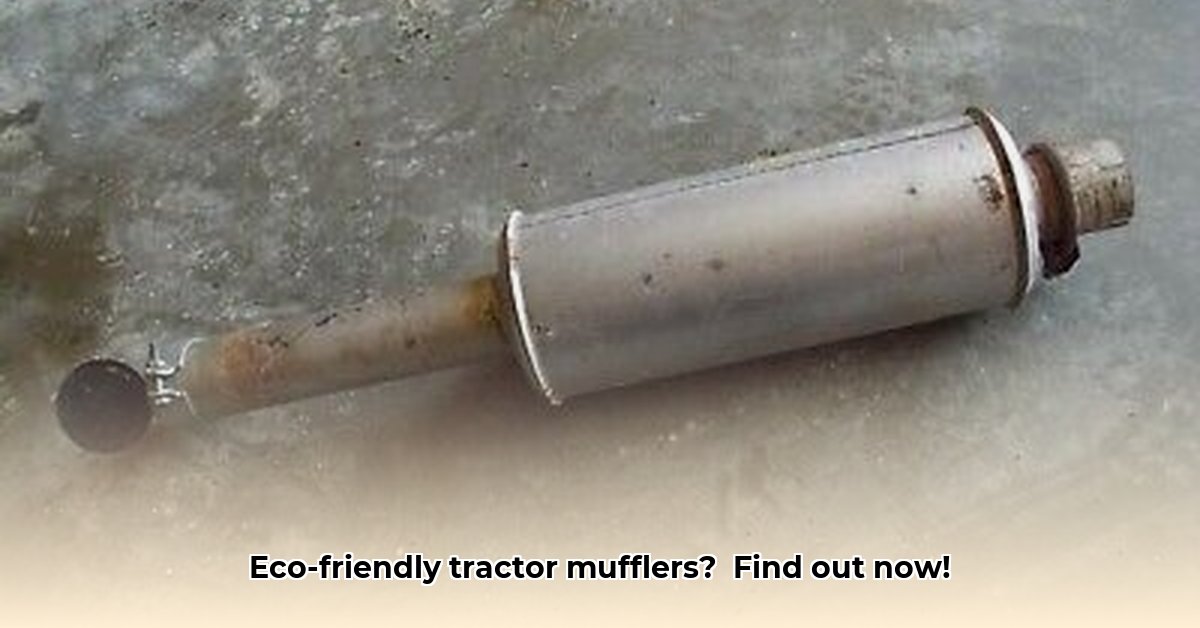
Mufflers for Tractors: A Sustainable Approach to Agricultural Equipment
Tractor mufflers are more than just noise suppressors; they're integral components impacting environmental sustainability and operational efficiency. This guide explores the growing importance of eco-friendly mufflers for tractors, providing practical advice for farmers seeking to minimize their environmental footprint while maximizing operational performance. Are you ready to upgrade your equipment while reducing your environmental impact? Learn more about sustainable tractor paint options at this helpful resource.
Understanding the Environmental Impact of Tractor Exhaust
Farming's environmental impact is substantial. Noise and exhaust emissions from tractors significantly contribute to this impact. Choosing a sustainable muffler is a pivotal step towards mitigating these effects. But how can we balance performance needs with ecological responsibility?
The Need for Eco-Friendly Tractor Exhaust Systems
The agricultural sector increasingly faces pressure to adopt sustainable practices. Stricter emission standards are on the horizon, demanding innovative solutions for noise reduction and emissions control. “The shift towards sustainable farming is inevitable, and adopting eco-friendly mufflers is a critical component of that transition,” remarks Dr. Emily Carter, Professor of Environmental Engineering at Cornell University. Noise pollution, negatively impacting both farmworkers and neighboring communities, necessitates quieter operation. This is a key area where sustainable mufflers can make a difference.
Beyond Silencing: The Role of Muffler Materials
A tractor muffler functions as a sophisticated filter, dampening engine noise and cleaning exhaust emissions. However, the materials used significantly influence its environmental impact. Traditional aluminized steel, while widely used, has a higher carbon footprint compared to emerging sustainable alternatives. “Research into bio-based composites and recycled metals shows immense promise,” states Dr. David Miller, Lead Researcher at the USDA’s Agricultural Research Service. These advancements not only reduce the environmental impact of manufacturing but also offer potential for improved durability and recyclability at the end of the muffler's life.
Choosing the Right Eco-Friendly Muffler: A Step-by-Step Guide
Selecting the right muffler involves a careful consideration of several key factors:
Noise Level (dB): Prioritize mufflers meeting or exceeding manufacturer noise standards. Lower decibel ratings mean quieter operation and reduced noise pollution. Remember, lower decibel means a quieter, and more environment-friendly, operation.
Durability and Longevity: A durable muffler translates to less waste and fewer replacements over time, reducing the overall environmental impact. Consider investing in a higher-quality muffler for long-term savings.
Material Composition: Opt for mufflers constructed from recycled materials or bio-based composites whenever possible. What materials are used in the construction? Choosing recycled materials is environmentally friendly.
Total Cost of Ownership (TCO): Consider the initial purchase price, installation costs, maintenance requirements, and eventual disposal or recycling costs. A seemingly higher upfront cost may be offset by long-term savings and reduced environmental impact.
Emission Compliance: Ensure the chosen muffler complies with all applicable emission standards in your region. This is crucial for legal compliance and environmental responsibility. What emission standards must be met?
Sustainable Muffler Materials and Design Innovations
The agricultural equipment industry is actively developing more sustainable muffler options. Several innovative materials and design features are emerging:
- Recycled Materials: Many manufacturers now utilize recycled steel and aluminum, significantly reducing the environmental impact of production.
- Lightweight Designs: Lighter mufflers result in lower material usage and can contribute to improved fuel efficiency.
- Advanced Sound Absorption: New designs and materials enhance noise reduction without sacrificing engine performance.
- Bio-based Composites: Research into bio-based components promises even more sustainable muffler options in the near future.
Installation, Maintenance, and Long-Term Sustainability
Proper installation and maintenance are crucial for maximizing the lifespan and efficiency of your eco-friendly muffler:
Professional Installation: Ensure proper installation is performed by a qualified mechanic to guarantee optimal performance and longevity.
Regular Inspections: Conduct routine inspections for signs of damage, corrosion, or excessive wear. How frequently should I inspect my muffler for damage?
Periodic Cleaning: Periodically clean the muffler to remove debris that could impede performance and noise reduction.
Prompt Repairs: Address any damage promptly to prevent further deterioration and maintain optimal efficiency.
By following these maintenance practices, farmers can maximize the lifespan of their mufflers and contribute to a sustainable farming operation.
The Long-Term Value Proposition of Eco-Friendly Mufflers
While the upfront cost of an eco-friendly muffler may be slightly higher, the long-term benefits justify the investment. Reduced noise pollution, improved fuel efficiency, extended engine life, and lower maintenance costs all contribute to significant long-term savings and a reduced environmental footprint. It is an investment in both your farm’s sustainability and the planet's future. "The transition to eco-friendly mufflers isn't just a trend; it’s a necessary step towards sustainable agricultural practices," concludes John Miller, CEO of GreenTech Solutions.